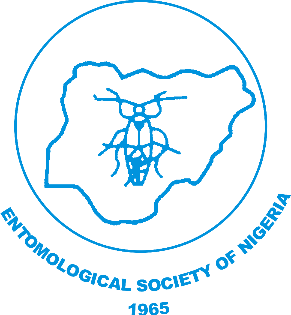Non Chemical Control of Leucinodes orbonalis Gueene on the Garden Egg Solanum aethiopicum L.
DOI:36108/NJE/5102/13.0142
ONEKUTU, A. AND OMOLOYE, A.A.
Nig. J. Ent. 31: 147-152 (2015)
ABSTRACT. The need to reduce and possibly eliminate the use of synthetic insecticides in the production of vegetables and other short duration crops is expedient. Consequently, non-chemical management of the eggfruit and shoot borer, Leucinodes orbonalis Guenee, on the garden egg, Solanum aethiopicum L, by periodic clipping of infested shoots (weekly, biweekly, twice weekly and untreated control) and bioassay of five local varieties (Lv), Lv Kano, Lv Maiduguri, Lv Makurdi, Lv Ibadan and Lv Enugu, for field resistance using standard procedures were investigated in the 2006 and 2007 planting season. The first experiment had four treatments and three replicates while the second had five treatments and three replicates with both arranged in randomized complete block design. Periodic clippings of infested shoots significantly (P<0.05) reduced infestation in both years when .compared with the untreated control. The lowest infestation of 17.84% was recorded on plots treated with weekly clipping of infested shoots and it was significantly lower (P<0.05) when compared with 25.93% and 25.11% recorded on plots subjected to twice a week and fortnightly clippings respectively in 2006. In 2007, there was no significant difference (P>O.05) in percentage infestation among the three treatments. The least EFSB infested variety was Lv Enugu with 16.14% (2006) and 22.16% (2007) percentage infestation while the most susceptible was Lv Kano with 37.29% (2006) and 32.72% (2007) percentage infestation. From this study, clipping of infested shoots and use of resistant variety can significantly increase the production of blemish-free garden eggs.
Keywords: Non-chemical control, Leucinodes orbonalis, Solanum aethiopicum.
